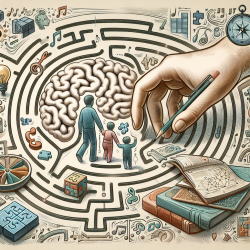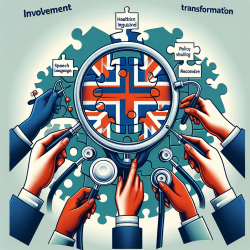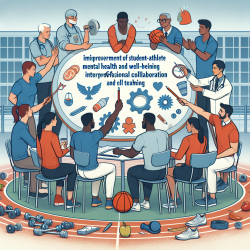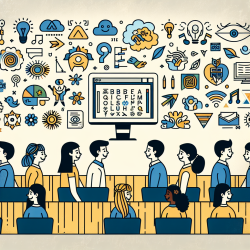Introduction
The integration of technology into therapeutic settings is rapidly evolving, offering novel ways to enhance mental health and well-being. One such innovation is the deployment of robotic positive psychology coaches, as explored in the research article "Deploying a Robotic Positive Psychology Coach to Improve College Students’ Psychological Well-Being." This study provides valuable insights that can be adapted to improve therapeutic outcomes for children, particularly in speech-language pathology. By understanding the implications of this research, practitioners can enhance their skills and contribute to better child outcomes.
Understanding the Research
The study conducted by Jeong et al. (2024) focused on deploying a robotic coach to deliver positive psychology interventions to college students. The findings indicated significant improvements in psychological well-being, mood, and motivation to change. Importantly, the study highlighted the role of rapport between the robot and the user, as well as the influence of personality traits on intervention outcomes. These insights are critical for practitioners aiming to implement similar technologies in pediatric settings.
Application in Speech-Language Pathology
For speech-language pathologists, the concept of a robotic coach can be particularly beneficial in engaging children in therapeutic activities. Children often respond well to interactive and engaging tools, and a robotic coach can provide a novel and stimulating environment for learning and practicing speech and language skills. Here are some ways practitioners can leverage this technology:
- Interactive Engagement: Robots can offer interactive games and activities that make learning fun and engaging for children. This can enhance motivation and participation, leading to better therapeutic outcomes.
- Personalized Interventions: By understanding a child's personality traits and preferences, robotic coaches can tailor interventions to meet individual needs, making therapy more effective.
- Building Rapport: The study emphasized the importance of rapport in achieving positive outcomes. A robotic coach can build rapport through consistent and personalized interactions, creating a supportive therapeutic environment.
- Monitoring Progress: Robots can track and monitor a child's progress, providing data-driven insights that help practitioners make informed decisions about therapy adjustments.
Encouraging Further Research
While the study provides a promising outlook on the use of robotic coaches, further research is necessary to explore their full potential in pediatric settings. Practitioners are encouraged to consider the following areas for further investigation:
- Long-term Effects: Investigate the long-term impact of robotic interventions on children's speech and language development.
- Behavioral Cues: Explore how verbal and nonverbal behavioral cues can be used to adapt interventions in real-time, enhancing their effectiveness.
- Technology Integration: Study the integration of robotic coaches with existing therapeutic practices and their impact on overall therapy outcomes.
Conclusion
The deployment of robotic positive psychology coaches represents a significant advancement in therapeutic interventions. By leveraging the insights from the study by Jeong et al., speech-language pathologists can enhance their practice and contribute to better outcomes for children. As we continue to explore the potential of technology in therapy, it is essential to remain focused on data-driven decisions and evidence-based practices to ensure the best possible outcomes for our young clients.
To read the original research paper, please follow this link: Deploying a robotic positive psychology coach to improve college students’ psychological well-being.










